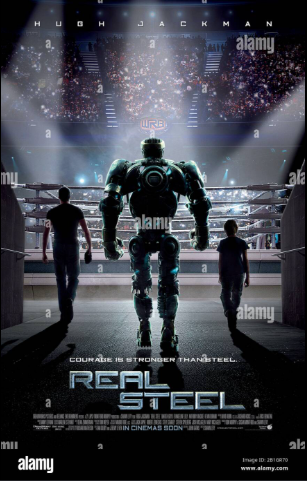When fierce competition arises, it leads to sparks flying. Sometimes, it does not need to be competition, but metal clashing against metal.
“Real Steel” a 2011 movie directed by Shawn Levy, follows a man and his son on a journey of struggle, patching a non-existent relationship, and fulfillment.
At first, Charlie treats Max like a side deal. His rich sister-in-law and her husband basically pay him to watch the kid while they go on vacation. Charlie jumps at the money, which tells you everything about him at that point. Selfish, careless, and honestly a little pathetic.
But here’s the thing, Real Steel isn’t really about flashy robot boxing. That’s just the hook. The real story is watching Charlie and Max slowly, painfully, start to bond.
It kicks off when they get their first robot, Noisy Boy. He looks cool, all lit up and covered in Japanese writing, but Charlie blows it in their first underground fight. He doesn’t listen to Max, he’s cocky, and the robot gets torn apart. That moment tells you two things, Charlie’s reckless, and Max actually knows what he’s talking about.
Then comes Atom. Max finds him half-buried in a junkyard, this old sparring bot that looks like trash. But Max sees something there. Against Charlie’s better judgment, they fix him up and start training. That’s when things really click. Charlie uses his old boxing experience, Max pushes Atom to learn new moves, and together they start winning fights.
It’s not just the fights.
Every win pulls Charlie and Max closer. They start trusting each other.
You can see Charlie softening up, actually caring about his kid instead of the next payout. There’s this montage of them fighting match after match, it’s cheesy, but it works.
You begin to want them to succeed—not just in the ring, but with each other.
“It was heartwarming to see them grow as father and son,” Andrew Cleiman said.
Of course, Charlie’s past catches up. The loan sharks he owes come looking, and after a nasty fight outside, Max gets taken back by his aunt and uncle.
For a moment, it feels like Charlie’s going to lose everything, his kid and his shot at redemption. But this is where the movie finally flips. Charlie doesn’t give up. He shows up for Max, really shows up, for the first time.
“It felt like everything that the movie was built on came to a stop when they got jumped,” Hunter Steward said.
All of it leads to the big showdown, Atom versus Zeus, the champion of robot boxing.
It’s David versus Goliath. Atom takes hit after hit, but he doesn’t go down. The crowd gets behind him, chanting, screaming, loving every second. Charlie fights through Atom, listening to Max, taking advice, working with him instead of shutting him out. It’s the most real Charlie’s been since the start of the film.
Here’s the kicker, Atom loses. He doesn’t knock out Zeus, doesn’t take the belt. But he wins anyway. The crowd names him “The People’s Champion,” and more importantly, Charlie and Max finally feel like father and son. For them, that’s the real victory.
So what’s the takeaway? Real Steel looks like a popcorn flick about robots beating each other up, but underneath, it’s a story about second chances. Charlie starts out as a selfish wreck, but Max gives him a reason to fight again—literally and figuratively. The movie’s saying it’s never too late. Never too late to fix things, never too late to care, and never too late to try.
Is it perfect? No. Some of the dialogue’s cheesy, the plot predictable, and yeah, the robot stuff sometimes takes a backseat. But honestly, that’s what makes it work. If this movie was just metal smashing metal, it would’ve been forgettable. What makes it stick is the heart behind the fights.
In the end, Real Steel isn’t about robots at all. It’s about a dad and son who find each other when they need someone the most. And that’s why, even years later, it still hits.
